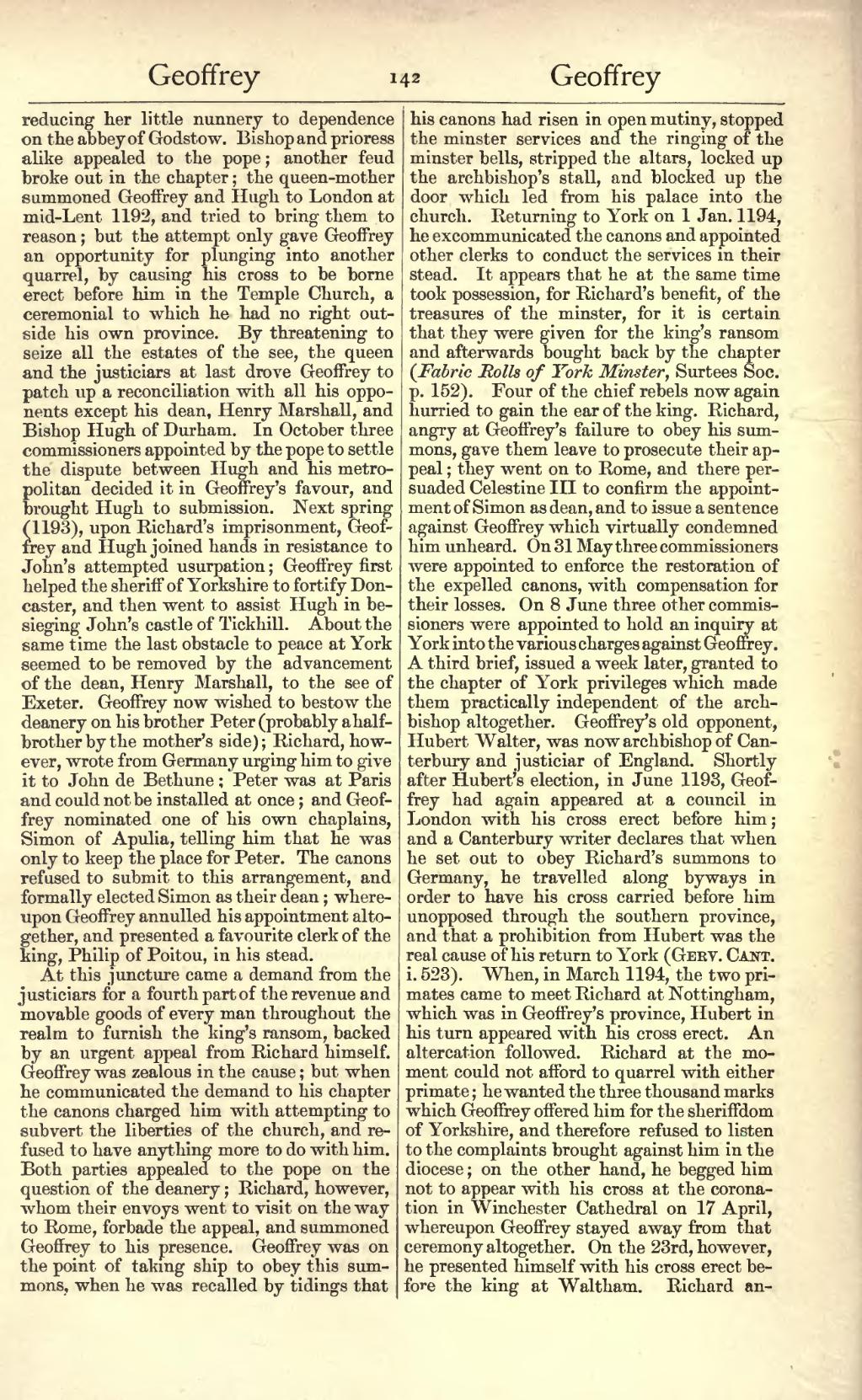reducing her little nunnery to dependence on the abbey of Godstow. Bishop and prioress alike appealed to the pope; another feud broke out in the chapter: the queen-mother summoned Geoffrey and Hugh to London at mid-Lent 1192, and tried to bring them to reason; but the attempt only gave Geoffrey an opportunity for plunging into another quarrel, by causing his cross to be borne erect before him in the Temple Church, a ceremonial to which he had no right outside his own province. By threatening to seize all the estates of the see, the queen and the justiciars at last drove Geoffrey to patch up a reconciliation with all his opponents except his dean, Henry Marshall, and Bishop Hugh of Durham. In October three commissioners appointed by the pope to settle the dispute between Hugh and his metropolitan decided it in Geoffrey's favour, and brought Hugh to submission. Next spring (1193), upon Richard's imprisonment, Geoffrey and Hugh joined hands in resistance to John's attempted usurpation; Geoffrey first helped the sheriff of Yorkshire to fortify Doncaster, and then went to assist Hugh in besieging John's castle of Tickhill. About the same time the last obstacle to peace at York seemed to be removed by the advancement of the dean, Henry Marshall, to the see of Exeter. Geoffrey now wished to bestow the deanery on his brother Peter (probably a half-brother by the mother's side); Richard, however, wrote from Germany urging him to give it to John de Bethune; Peter was at Paris and could not be installed at once; and Geoffrey nominated one of his own chaplains, Simon of Apulia, telling him that he was only to keep the place for Peter. The canons refused to submit to this arrangement, and formally elected Simon as their dean; whereupon Geoffrey annulled his appointment altogether, and presented a favourite clerk of the king, Philip of Poitou, in his stead.
At this juncture came a demand from the justiciars for a fourth part of the revenue and movable goods of every man throughout the realm to furnish the king's ransom, backed by an urgent appeal from Richard himself. Geoffrey was zealous in the cause; but when he communicated the demand to his chapter the canons charged him with attempting to subvert the liberties of the church, and refused to have anything more to do with him. Both parties appealed to the pope on the question of the deanery; Richard, however, whom their envoys went to visit on the way to Rome, forbade the appeal, and summoned Geoffrey to his presence. Geoffrey was on the point of taking ship to obey this summons, when he was recalled by tidings that his canons had risen in open mutiny, stopped the minster services and the ringing of the minster bells, stripped the altars, locked up the archbishop's stall, and blocked up the door which led from his palace into the church. Returning to York on 1 Jan. 1194, he excommunicated the canons and appointed other clerks to conduct the services in their stead. It appears that he at the same time took possession, for Richard's benefit, of the treasures of the minster, for it is certain that they were given for the king's ransom and afterwards bought back by the chapter (Fabric Rolls of York Minster, Surtees Soc. p. 152). Four of the chief rebels now again hurried to gain the ear of the king. Richard, angry at Geoffrey's failure to obey his summons, gave them leave to prosecute their appeal; they went on to Rome, and there persuaded Celestine III to confirm the appointment of Simon as dean, and to issue a sentence against Geoffrey which virtually condemned him unheard. On 31 May three commissioners were appointed to enforce the restoration of the expelled canons, with compensation for their losses. On 8 June three other commissioners were appointed to hold an inquiry at York into the various charges against Geoffrey. A third brief, issued a week later, granted to the chapter of York privileges which made them practically independent of the archbishop altogether. Geoffrey's old opponent, Hubert Walter, was now archbishop of Canterbury and justiciar of England. Shortly after Hubert's election, in June 1193, Geoffrey had again appeared at a council in London with his cross erect before him; and a Canterbury writer declares that when he set out to obey Richard's summons to Germany, he travelled along byways in order to have his cross carried before him unopposed through the southern province, and that a prohibition from Hubert was the real cause of his return to York (Gerv. Cant. i. 523). When, in March 1194, the two primates came to meet Richard at Nottingham, which was in Geoffrey's province, Hubert in his turn appeared with his cross erect. An altercation followed. Richard at the moment could not afford to quarrel with either primate; he wanted the three thousand marks which Geoffrey offered him for the sheriffdom of Yorkshire, and therefore refused to listen to the complaints brought against him in the diocese; on the other hand, he begged him not to appear with his cross at the coronation in Winchester Cathedral on 17 April, whereupon Geoffrey stayed away from that ceremony altogether. On the 23rd, however, tie presented himself with his cross erect before the king at Waltham. Richard an-
